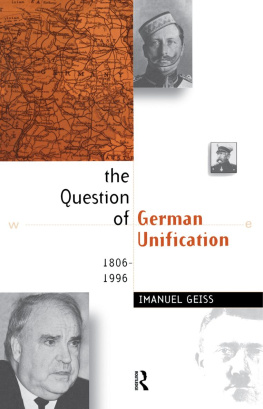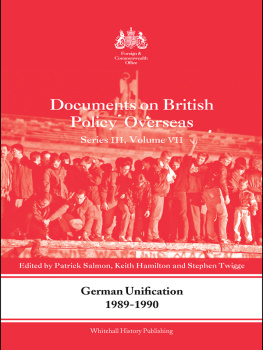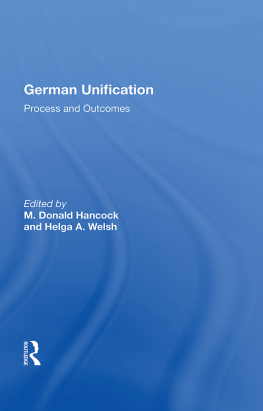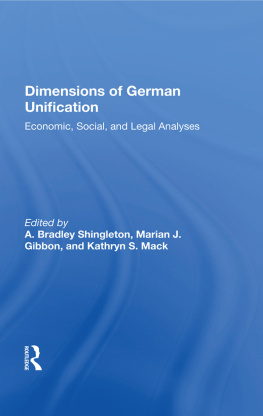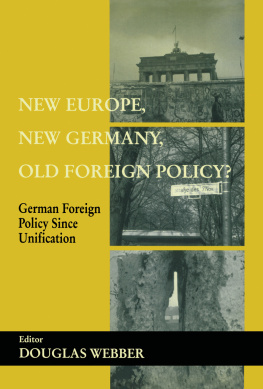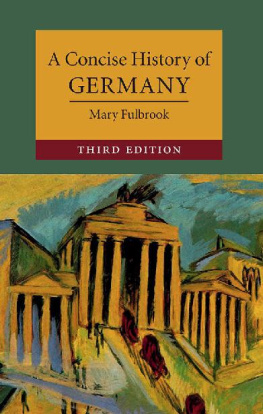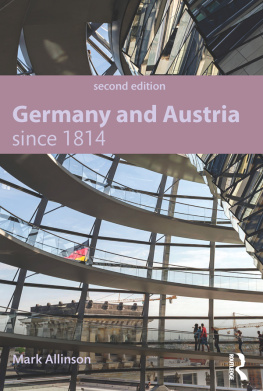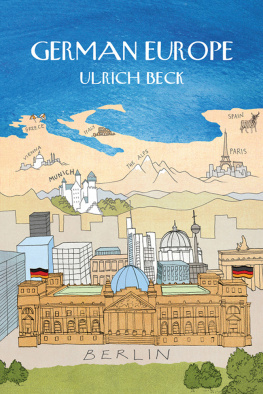The Question of German Unification
The Question of German Unification by Imanuel Geiss presents an introduction to the last two hundred years of German history and addresses questions raised by the status of Germany as a single or split national state. Updating his earlier work on the subject, Imanuel Geiss counters possible objections from both the Left and Right.
Events in Eastern Europe, the collapse of European Communism and German reunification have once again brought issues of Germany's status into the arena of world politics. Imanuel Geiss argues that Germany has fluctuated all too frequently, and catastrophically, between the status of power centre in Europe and power vacuum. The Question of German Unification focuses on special features of German history and looks at Germany within a European framework. By detailing long-term structures and processes, the author analyses the political, economic and social aspects of German nationalism as well as the impact on Germany of the collapse of Communism.
The Question of German Unification includes discussion of recent political events as well as a chronology and further reading. Imanuel Geiss reflects on the irrationalities of German history, surveys how they have been explained by historians, and provides a succinct and readable account of the complex issues.
Imanuel Geiss is Emeritus Professor of history at Bremen University. His publications include 8 July 1914, The Pan-African Movement, Geschichte griffbereit, Geschichte im berblick, Europa Einheit und Vielfalt, Der Jugoslawienkrieg, Geschichte des Rassismus and Der Zerfall der Sowjetunion.
Fred Bridgham is the author of studies of Rilke, Kafka and Nietzsche, and of other essays on German history and culture. His most recent book is The Friendly German-English Dictionary (Libris, 1996). He translated Hans Werner Henze's Der Prinz von Homburg for performance by English National Opera.
The Question of German Unification
18061996
Imanuel Geiss
Translated by
Fred Bridgham
First published 1997
by Routledge
Published 2013 by Routledge
2 Park Square, Milton Park, Abingdon, Oxon OX14 4RN
Simultaneously published in the USA and Canada
by Routledge
711 Third Avenue, New York, NY, 10017, USA
Routledge is an imprint of the Taylor & Francis Group, an informa business
Translated from the German: Die deutsche Frage 18061990,
Bibliographisches Institut & F.A. Brockhaus AG, Mannheim 1992.
This translation 1997 Routledge
Typeset in Times by RefineCatch Limited, Bungay, Suffolk
All rights reserved. No part of this book may be reprinted or reproduced or utilized in any form or by any electronic, mechanical, or other means, now known or hereafter invented, including photocopying and recording, or in any information storage or retrieval system, without permission in writing from the publishers.
British Library Cataloguing in Publication Data
A catalogue record for this book is available from the British Library
Library of Congress Cataloguing in Publication Data
Geiss, Imanuel.
[Deutsche Frage. English]
The question of German unification: 18061996 / Imanuel Geiss.
p. cm.
Includes bibliographical references.
1. German reunification question (19491990) 2. NationalismGermanyHistory. 3. GermanyHistory17891900. 4. GermanyHistory20th century. 5. GermanyRelationsEurope. 6. EuropeRelationsGermany. I. Title.
DD203.G4513 1997
943.07dc21 9652536
ISBN 13: 978-0-415-15049-1 (pbk)
Contents
Interest in the German Question increased throughout the 1980s both in the Federal Republic and in the former GDR if only in a subdued way in the East, where public opinion inevitably remained underground and unarticulated. With the collapse of European communism in 1989/91, the German Question re-entered the agenda of world politics. Since then, the need for a full account of its special features and peculiarities has become ever more pressing. Germany has oscillated all too often, and catastrophically, between being either a power centre or a power vacuum in Europe. But an attempt to explain the German Question in these terms should not be thought of as reflecting some new consciousness of German power. It is entirely pragmatic. Within a necessarily brief compass, it is the political dimension which most readily permits a clear reading of German history, though one also naturally grounded in economic and social history, and embedded at least briefly in a European framework.
I am grateful to the publishers for the opportunity to produce this long-planned, compact overview, an elaboration on several preliminary studies. For reasons of space, and since a similar volume on European history has already appeared,as the First or Second World Wars, the Holocaust or the Cold War, the more superfluous and indeed unhelpful bibliographical references become.
My thanks to Frau Renate Brock and Frau Gabriele Intermann of Bremen for providing a fair copy and for their critical and constructive help at the manuscript stage.
Imanuel Geiss
Bremen, March 1992
This slightly expanded English edition retains the tight overall structure rigorously imposed by the original format to the ultimate benefit, it is to be hoped, of the book itself. At the same time, released from the German strait-jacket, it provides an opportunity to answer criticisms and anticipate possible objections, both hostile and legitimate: it does not aim to provide a comprehensive survey of German history in the nineteenth and twentieth centuries, but rather a succinct and readable account of the bewilderingly complex issues raised by what is loosely known as the German Question. Historians of the progressive Left also speak of Germanys special path as something which distinguishes her from the West, though without attempting to define these terms in a rational that is to say, an historical way.
Faced with the irrationalities of German history, German historians have themselves reflected only too faithfully its sudden discontinuities and disastrous swings from one extreme to the other. Until 1968, a year of symbolic significance, the German hysterianow the parallel is made quite blatantly in a way which, before 1989/91, would have been condemned by the Left as an apologia for National Socialism, and which in the Historikerstreit would have been labelled neo-conservative.
Consequently, the leading German historians have as yet been unable to provide a coherent and convincing historical explanation for the collapse of Communism and its impact on Germany. Since criticism of the present attempt at orientation is to be expected from adherents of the Habermas-Wehler school, some introductory remarks are necessary; reasons of space alone prevented their inclusion in the German edition. In Germany, this first attempt, however inadequate, to give an historical explanation for the events of 1989 has met with total silence from the honest scholarship of the new orthodoxy of the Left, whose leader (Wehler) duly passed verdict on the author by letter as an intolerable renegade. Critical discussion long overdue, yet something which ought to go without saying in a scholarly and democratic context might now perhaps be set in motion in Germany via the English-speaking world.
Essentially, the structure of the book remains unaltered: it looks at fluctuations in Germanys fortunes between its status as a power vacuum since the late Middle Ages, and the three occasions 1871, 1938, 1990 when it rose to become a power centre. Since experience suggests that power vacuum and power centre may not be totally self-explanatory to English readers, the introductory section offers some brief elucidation of these elementary categories in relation to Germany past and present, and of two further key concepts in the history of power: quantitative and qualitative.

